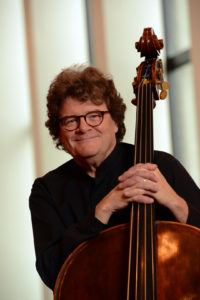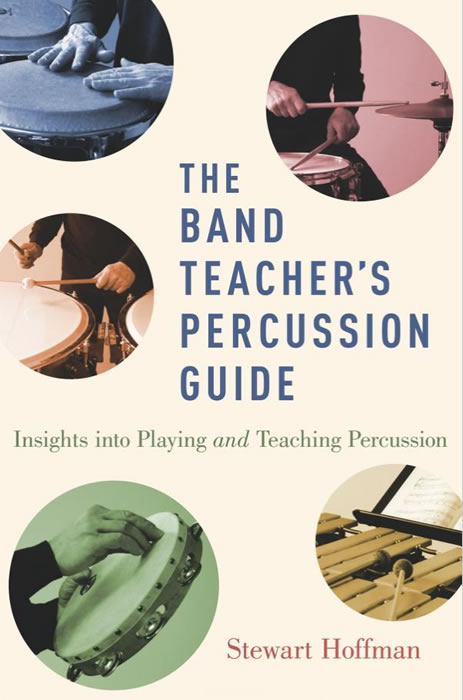A League of His Own
(Profile of bassist Joel Quarrington)

Joel Quarrington “has always been innovative,” says friend and TSO bassist Chas Elliot. “He was always the one to push the envelope.”
Performance magazine, Winter 2005
By Stewart Hoffman
It’s a brilliant July afternoon and at Parry Sound’s Stockey Centre for the Performing Arts bassist Joel Quarrington is performing a Dvorak quintet as if his life depended on it. Which is nothing unusual for Quarrington. That’s just the way he plays – absolutely focused, breathing along with each phrase as he digs his bow deep down into the thick strings of his instrument, he provides a musical foundation that’s as solid as the hall’s exposed stone and timber.
The Dvorák is being performed with the New Zealand String Quartet, a collaboration forged by Festival of the Sound director James Campbell. The quartet’s cellist, Rolf Gjelsten, points out that when Campbell first called him in Wellington, he asked: “How would you like to play with the best bass player in the world?’” There’s no indication that Gjelsten feels he was misled.
“His sound is like velvet,” says the cellist. “He has fantastic articulation. And his playing has so much rhythmic impetus. It feels like he is running the show. At the same time, you feel you can be as flexible as possible. We played Dvorak with another bass player who was fine. This is a different league.”
It’s a league, in this country at least, that the Toronto Symphony Orchestra’s principal bassist occupies on his own. Ask Quarrington’s longtime friend Chas Elliott, another TSO bassist, what Quarrington was like as a student, and he readily admits that “he was leaps and bounds ahead of all of us. He had a level of virtuosity beyond where any of us were. Tom [Monohan, the TSO’s former principal bass and Quarrington’s teacher] recognized it early on. Joel was working on things I’ve never worked on.”
At 50 years old, Joel Quarrington’s still working on things – apparently all the time. Walking along the Parry Sound Harbour to grab a quick lunch before his afternoon rehearsal, he’s on his cell phone, still talking bass, excited about a recent discovery.
“I’ve been doing something new when playing with a large piano,” he announces enthusiastically into the phone, “leaving the lid open, but turning the piano around.” Balancing the deep, resonant tones of the bass with those of a grand piano have always posed a dilemma, one traditionally solved by adjusting the height of the piano lid. But Quarrington has never blindly followed tradition. “It has to do with the sound reflecting off the piano lid,” he explains, then asks, utterly baffled: “Why has no one ever done this?”
Why, indeed. It’s this constant questioning that has led Quarrington along musical paths that have never been taken before – though you can be forgiven if at first you don’t recognize the seriousness with which he takes his art. There’s the look of an overgrown boy about Quarrington, something in his eyes that suggest he’s planning some sort of mischief. And his sense of humour can be totally off the wall.
He plays the erhu, the traditional Chinese two-stringed instrument, but admits his playing is “truly terrible” – which hasn’t dissuaded him from producing seven CDs with titles such as Everybody Digs the Erhu, Erhu From Beyond the Galaxy and Country Erhu ’98.
He has a reputation as a prankster, though that might be a holdover from his youth. Once, for example, during a session of the National Youth Orchestra, Quarrington hid under his dormitory bed, determined to scare the living daylights out of his roommate. When his victim returned to the room and shuffled over to within striking distance, Quarrington’s hand darted out from under the bed and latched onto an ankle. His colleague instinctively executed a leap worthy of an Olympic gold medal. It’s unclear just how long Quarrington had lain in wait under the bed, maybe 10 minutes, maybe 20 – though Quarrington pegs it at 45. What it comes down to is that Quarrington is serious and single-minded about everything, even about being funny.
So it may not come as too much of a surprise that Quarrington, with his questioning mind, singularity of purpose and virtuoso technique, is considered an innovator on his instrument. Indeed, Britain’s Double Bassist magazine commented that he has “expanded the boundaries of bass playing.” That was back in 1998. In 2005, his stated goal is nothing short of “revolutionizing” the art of bass playing.
The household in which Quarrington grew up seems to have been a breeding ground for nonconformists, for original thinkers – and funny people. He has two brothers. Paul is the novelist and humourist, author of Whale Music, Galveston and King Leary, for which he won the Stephen Leacock Award for Humour. Tony is a prominent jazz guitarist and songwriter. Sister Christine is a research manager at the University Health Network.
They were the children of psychologists, who, Quarrington concedes, were a little off beat. “They weren’t into housecleaning for instance. They were into free thought, ridiculing religion, stuff like that.” And they encouraged individualism. “They encouraged us to be suspicious of anything that was popular.”
Creativity was encouraged, and there was always music in their north Toronto home. The brothers played together in bands. Joel experimented with guitar, drums and piano. Tony played a mean banjo, as well as bass guitar – until Joel picked up the instrument when he was about 10.
He discovered double bass in grade 7 at Don Mills Collegiate. Only four-and-a-half feet tall, he was dwarfed by the instrument. Nevertheless, when the teacher demonstrated it, “it made the skylight rattle.” That, along with the fact that it was “the least geeky of all the string instruments,” hooked him.
“Once he started playing double bass,” says Paul, “we didn’t really play together anymore. He was pretty single minded from the word go.” Joel says he practised eight hours a day in the summers, 16 if he missed a day.
He studied in Toronto with Tom Monohan and Peter Madgett, who was and remains a member of the TSO’s bass section. But curiosity led him to study with the foremost bassists in Europe, Ludwig Streicher in Vienna and Franco Petracchi in Rome. “Joel has always been innovative,” says Chas Elliott. “He was the first student from here to study with Streicher and Petracchi, and he came back with new ideas. He was always the one to push the envelope. People don’t like that if they’re comfortable and set in their ways. But to move forward, you have to change.”
In 1976, Quarrington won first prize in the CBC Talent Festival, and took the top medal in the Geneva International Bass Competition two years later. In 1979 he became principal bassist of the Hamilton Philharmonic, and assumed that position with the TSO in 1991.
He is the most in-demand bassist in the country, performing as soloist with orchestras and working with the finest chamber ensembles on the continent. A faculty member of the Royal Conservatory of Music, he has also conducted master classes at such renowned institutions as Philadelphia’s Curtis Institute and London’s Royal Academy of Music. His second disc of the music of 19th century bass virtuoso/composer Giovanni Bottesini was recorded in August for the NAXOS label. Next April, Quarrington and the TSO premiere a bass concerto by the distinguished American composer John Harbison at the New Creations Festival in Toronto.
Still, as remarkable as his career as a performing artist is, a question remains: Where is the revolution?
The answer lies in the fact that Quarrington, the day after receiving tenure with the TSO, changed the tuning of his open bass strings from the way practically everyone tunes a bass, E-A-D-G, to C-G-D-A – From intervals of fourths to intervals of fifths. This is where the revolution comes in.
Bass playing techniques, explains Quarrington, as well as the instrument itself, have been standardized for only a short time. The problem, in a nutshell, was developing an instrument that could best reach the low notes composers wanted to hear – generally speaking, cello notes sounded an octave lower. Early technologies couldn’t produce bass strings – longer and thicker than those of any other instrument – that sounded good. Made of thick gut, they were so difficult to play that bassists wore gloves to avoid burn.
Performers experimented with different tuning systems, while instrument makers came up with instruments with three-, four-, five- and even six-strings. Finally, the four-stringed instrument we see today, tuned in fourths, became the standard. The problem is, cellos are tuned in fifths. And without getting into a dissertation on musical acoustics, that disparity throws things out of whack.
Of course, remind Quarrington that he spoke of “revolutionizing bass playing” and his response is one of mock astonishment. “I did?” he shoots back. “Was I drinking?” But he immediately settles into an impassioned defense of his cause, and you realize he’s dead serious.
Type the phrase “double bass tuning fifths” into your computer’s search engine and you’ll find Quarrington’s name peppered throughout the first few pages. He’s writing a three-part method book, a “massive tome” detailing technical concepts fully integrated with his tuning system. “What it’s all about,” he says, “is clearer sound, and perfect intonation with the cellos. An instrument tuned in fifths is more alive.”
But the movement is still in its infancy. And understandably so. After all, it takes months, or longer, for a seasoned musician to make the switch. “After years of playing notes here, here and here,” explains Chas Elliott, “suddenly they’re not there anymore.” Think touch typing with the keyboard all jumbled up.
Not that Quarrington expects everyone to relearn how to play bass. “But,” he insists, “there’s no reason young players can’t learn this. I’m not going to win this battle in my lifetime, but it has to start somewhere.”
It all comes back to lessons learned long ago, about questioning the status quo, and having the strength of your convictions. Most of what people believe to be true, Quarrington points out, usually isn’t. “There’s some inaccuracy somewhere. So it makes sense to make up your own mind about things, doesn’t it?”
(Profile of bassist Joel Quarrington)


